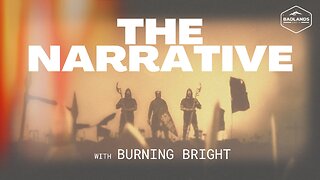Premium Only Content

Historical & Biblical Evidence for Perfect Preservation of Scripture (OT / NT Hebrew / Greek / KJV)
Scripture teaches the verbal, plenary preservation of the infallibly inspired Greek and Hebrew Old and New Testament. The perfectly preserved Word of God is found in the Hebrew Textus Receptus, the Ben Asher Masoretic Text (MT) edited by Hebrew Christian Jacob ben Chayyim, and the Greek Textus Receptus, (TR) the Old and New Testament texts from which the Authorized, King James Version (KJV / KJB / AV) was translated.
Biblical principles of preservation include:
1.) The Bible promises that God will preserve every one of His words forever down to the very jot and tittle, the smallest letter.
2.) The Bible promises that God would make His words generally available to every generation of believers.
3.) The Bible promises that God would lead His saints to receive all His certain words, which the true churches of Christ would guard.
"The just shall live by faith” (Romans 1:17).. We believe in order that we may understand.
The modern critical Greek text of Scripture, represented in the Nestle-Aland and United Bible Society editions (NA / UBS), differs in around 7% of its text from the Received Bible. The translation philosophy of this Greek text rejects Scripture’s teaching on preservation. The printed Hodges-Farstad and Robinson-Pierpont Majority texts, while far superior to the critical NA / UBS texts and far closer to the perfectly preserved TR, do not fit the Scriptural pattern for the preservation of Scripture when they differ from the Received Text.
Overwhelming historical evidence confirms the preservation of the Old and New Testament. Over 20,000 manuscripts (MSS) of the Hebrew Old Testament exist. Liberal textual critic Emmanuel Tov admits: “[I]t is not easy to provide convincing proof of . . . errors in M [the Masoretic Hebrew text of the Bible].” As far back as we have manuscript evidence, the Hebrew Masoretic text is recognized as the preserved, canonical text. Any claims of corruption in the Hebrew MT must be based on speculation about what allegedly happened before we start to get actual physical evidence, for the physical evidence supports the Hebrew text's preservation. The Dead Sea Scrolls provide overwhelming confirmation of the Old Testament. New Testament quotations from the Old Testament were often intentionally paraphrases (Targumming). The Hebrew vowel points are inspired, not the consonants alone, validating, for example, that Jehovah, not Yahweh, is the correct pronunciation of the Divine Name.
The New Testament has also been perfectly preserved. There are four types of NT manuscripts: papyri, uncials, minuscules, and lectionaries. Paypri support the Textus Receptus rather than the Greek critical text 85%/15%; uncials support the TR 97% / 3%; minuscules 99% / 1%. 100% of lectionaries support the Received Text.
The Bible is by far the most attested ancient work in ancient history. With over 5,600 Greek MSS, over 10,000 Latin MSS, and over 9,300 MSS of the other versions: Old Latin, Syriac, Coptic, Gothic, Ethiopic, Armenian, Georgian, Scythian, Persian, Bohemian, Arabic, Slavonic, (Ancient) German, and Anglo-Saxon, for over 24,000 NT MSS total. If the NT is not reliable, nothing is reliable. Skeptics who reject the Bible’s transmissional reliability they must also consider unreliable all other manuscripts of antiquity and throw out their knowledge of the classical world. Some skeptics, like Bart Ehrman, do indeed deny knowledge of all ancient texts in order to reject the NT: [For] [t]he New Testament we have much earlier attestation than for any other book or manuscript ... Well, then you can’t trust any book from antiquity. ... [Including] Plato ... Homer ... Suetonius ... Tacitus, Euripides ... we don’t have the original text for any writing from the ancient world.” If the Bible has not been preserved, then nothing has been preserved.
Based on Scripture’s promises, we expect that the true churches in the Baptist/Anabaptist line would have the pure Word of God, received from the Apostles, and pass it on. We would also expect that God would, in His grace and His mercy to the world, have a Bible that was not filled with corruption be what was copied and passed down even by unbelievers. These expectations are fulfilled in history. The Baptist/Anabaptist churches had a pure Bible available to them, even before the time of printing, while copyists of the Greek NT copied the type of text that is found in the Received Text that underlies the KJV.
NT scribes of the TR were incredibly careful, copying MSS that are identical for the length of entire Biblical books.
By contrast, the manuscripts critical text advocates claim are the “oldest and best” are actually some of the worst MSS we have. Codices Aleph, B, and D are untrustworthy and corrupt NT MSS. There are more differences between Aleph and B in the Gospels alone then there are between the TR and the UBS/NA text in the entire NT.
From the 2021 Word of Truth Conference at Bethel Baptist Church in El Sobrante, CA.
-
 1:48:26
1:48:26
Tucker Carlson
2 days agoKristen Breitweiser: 9-11 Cover-Ups, Building 7, and the Billion-Dollar Scam to Steal From Victims
165K375 -
 5:48
5:48
Russell Brand
2 days agoThey BURNED me in effigy!
45.8K31 -
 1:21:40
1:21:40
Man in America
4 hours agoThe Secret AI Plan to Enslave Humanity — And Why It Will FAIL w/ Todd Callender
34.6K5 -
 2:18:17
2:18:17
TheSaltyCracker
5 hours agoTreason Season ReeEEStream 11-23-25
138K163 -
 3:10:33
3:10:33
Badlands Media
22 hours agoThe Narrative Ep. 47: Arctic Alliance
54.3K6 -
 LIVE
LIVE
SpartakusLIVE
4 hours agoLIVE from the Creator House in FLORIDA || WZ Solos to Start - PUBG, REDSEC or ARC Later?!
569 watching -
 58:03
58:03
MattMorseTV
5 hours ago $45.84 earned🔴Trump is BRINGING the CHARGES. 🔴
63.3K136 -

EricJohnPizzaArtist
4 days agoAwesome Sauce PIZZA ART LIVE Ep. #70: Movie Night featuring Dark Helmet!
37.4K8 -
 2:06:00
2:06:00
Joker Effect
3 hours agoMASSIVE UPDATES ON MY CHANNEL... what does 2026 look like? CHATTIN WITH WVAGABOND (The Captain).
22K2 -
 2:24:34
2:24:34
vivafrei
15 hours agoEp. 292: Bondi's Betrayal & Comey Judge Caught Lying! Crooks Acted Alone? Judicia Activism & MORE!
201K154